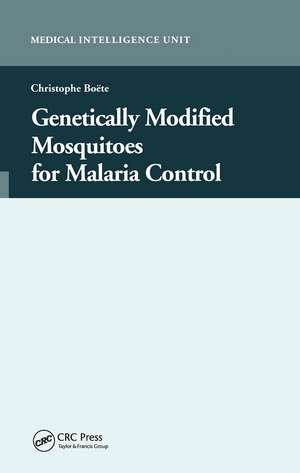Genetically Modified Mosquitoes for Malaria Control
Autor Christophe Boeteen Limba Engleză Paperback – 3 dec 2019
In the last decade, molecular biology has been a source of great hope for creating genetically-modified mosquitoes able to resist the malaria parasite. If technical progress permits confidence in the creation of such non-vectors, many questions remain open concerning the putative success of their deployment and the resultant reduction of malaria transmission. Indeed the understanding of the coevolutionary processes underlying malaria/mosquito interactions is crucially lacking despite its enormous importance. Moreover, when discussing transgenic mosquitoes, one critical point is the spread of the allele conferring resistance in mosquito populations ensuring the replacement of a or several populations of vectors able to transmit malaria by (theoretically) unable one(s). However, invading a whole population of mosquitoes with a transgene (composed with an allele conferring malaria-resistance and a driving system) is unlikely to be an easy task, it will at least depend on the population structure and on the quality of the driver. Alongside this, it appears that the spread of refractoriness itself is necessary but not sufficient as interactions between the allele of interest, the parasite and the environment may affect refractoriness and thus limit the expected success in terms of malaria control. Indeed the aim of a release of transgenic mosqui
Preț: 352.95 lei
Preț vechi: 477.21 lei
-26% Nou
Puncte Express: 529
Preț estimativ în valută:
67.56€ • 73.41$ • 56.79£
67.56€ • 73.41$ • 56.79£
Carte tipărită la comandă
Livrare economică 21 aprilie-05 mai
Preluare comenzi: 021 569.72.76
Specificații
ISBN-13: 9780367446307
ISBN-10: 0367446308
Pagini: 174
Dimensiuni: 152 x 229 mm
Greutate: 0.45 kg
Ediția:1
Editura: CRC Press
Colecția CRC Press
ISBN-10: 0367446308
Pagini: 174
Dimensiuni: 152 x 229 mm
Greutate: 0.45 kg
Ediția:1
Editura: CRC Press
Colecția CRC Press
Public țintă
Academic and Professional ReferenceCuprins
1. Malaria Situation in the Beginning of the 21st Century 2. Malaria and Structural Adjustment: Proof by Contradiction 3. Development of a Toolkit for Manipulating Malaria Vectors 4. Immune System Polymorphism: Implications for Genetic Engineering 5. Predicting the Spread of a Transgene in African Malaria Vector Populations: Current Knowledge and Limitations 6. Advantages and Limitations of Transgenic Vector Control: Sterile Males versus Gene Drivers 7. Malaria-Refractoriness in Mosquito: Just a Matter of Harbouring Genes? 8. The Epidemiological Consequences of Reducing the Transmission Intensity of P. falciparum 9. Malaria Parasite Virulence in Mosquitoes and Its Implications for the Introduction and Efficacy of GMM Malaria Control Programmes 10. Thinking Transgenic Vectors in a Population Context: Some Expectations and Many Open-Questions 11. The Genetics of Vector-Host Interactions: Alternative Strategies for Genetic Engineering for Malaria Control 12. Genetically-Modified Mosquitoes for Malaria Control: Requirements to Be Considered before Field Releases 13. Ethics and Community Engagement for GM Insect Vector Release 14. Transgenic Mosquitoes for Malaria Control: Time to Spread Out of the Scientific Arena
Descriere
This book describes the epidemiological and evolutionary consequences of the use of genetically modified (GM) mosquitoes as well as research orientations and ethical issues concerning the use of GM mosquitoes. It also includes discussion on transgenic mosquitoes for malaria control.
